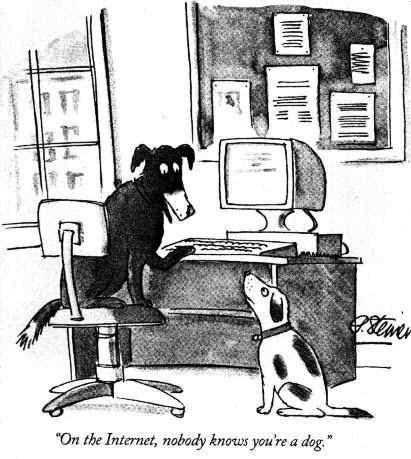Back in 1993, after Peter Steiner’s “on the internet no-one knows you’re a dog” cartoon was published in The New Yorker (pg 61 of July 5, 1993), everyone seemed to have it up on their wall. I remember falling over myself laughing at it, because we were all coming to terms with online identities and their general slipperiness.

Recently there have been lots of discussion of libraries who set up their own MySpace account. For example, here, here, here and here. The recipe seems to be: “Go to where your users are (MySpace), get an account, add some information, and maybe a catalogue search box, get some friends and voila! an extra service point”. I wonder whether this is only an American trend, as I don’t know of any Australian libraries doing it…. although the Second Life Libraries have.
I know it is touted as A Good Thing, but my gut feeling when I see it is
“Nooooo it’s just for people…making real social contact, however banal…..leave them alone and don’t stick your nose in”.
The fine line between marketing and social contact is so very jumbled today, that I know it’s a naive response. Some corporations do try to find a way into online social space to market their wares, but I believe that most libraries are there because they want to be part of the conversation and to offer users better service.
In our physical spaces, social contact is definitely one of our roles – chatting with staff behind the counter as you check your books out each week is a very important part of many people’s lives. Even when we offer self-checkout stations, people will pop over to the counter after checking the books to say hello.
But last night, something occured to me that I find even more disturbing. What if avatars in Second Life stop only representing people? Already some individuals have an “alt”, or alter avatar. I suspect some SL librarians have their “professional self” avatar..and then the naughty one who rushes around buying expensive strap on appendages for a different kind of SL experience. This is a “one person/many identities” setup.
How about the “many people/one identity arrangement? What if a library set itslef up as an avatar? Let’s call her “Ima Library”. Instead of going to a building to a reference service point, you could just IM Ima. Ima could come along to distance learning classes and teach information literacy. Same principle as libraries in MySpace, but one which somehow messes more with my mind.
And then..what if a blog took on an avatar. What if LibrariansMatter DingDong offered you friendship? How about NewModelHonda Esperanz , would you chat with her? Would you feel that a cynical marketing ploy was being pulled on you?
Back in the good old days of 1993, people were just people and libraries were just libraries and we all knew who was who…except, of course, those of us who were dogs.


